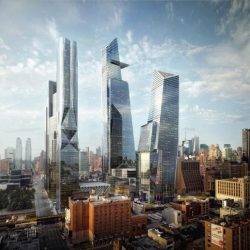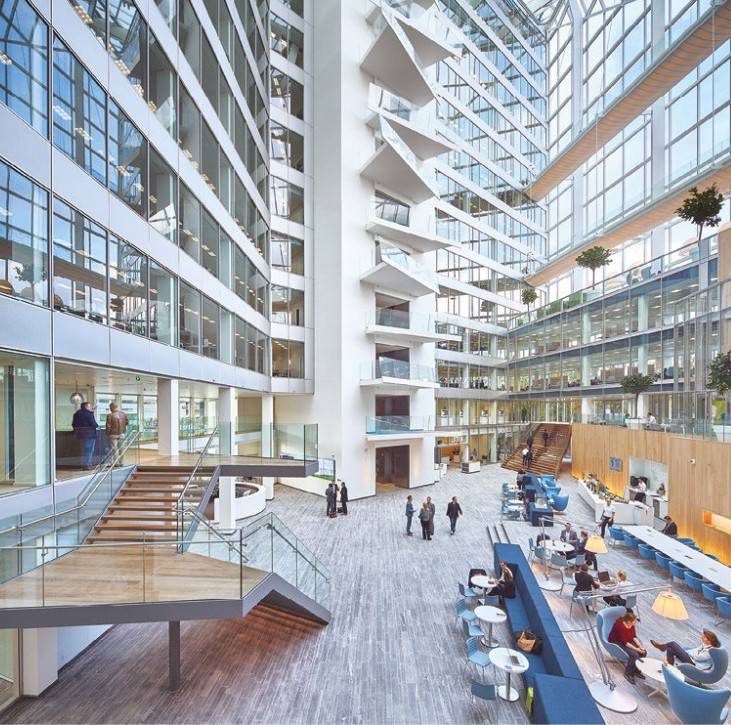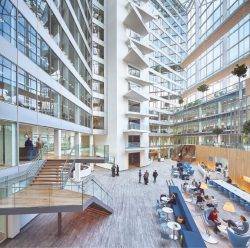July 3, 2018
Call for action within the built environment to help meet sustainable development goals
 Built environment organisations are calling for urgent action on issues such as consumption, innovation and infrastructure to prevent the UK slipping behind other nations on poverty, equality and the environment as a new report released today (3 July 2018) highlights the UK’s inadequate performance against the United Nations Sustainable Development Goals (SDGs), including those for the built environment. The report, Measuring up, from the UK Stakeholders for Sustainable Development (UKSSD), is the first comprehensive assessment of the UK’s performance against all 17 SDGs and highlights a significant danger that quality of life in the UK will worsen if action is not taken. Just some of the findings of the report include; that the UK is performing well (green) on only 24 percent of its targets; no industry, innovation and infrastructure targets have achieved a ‘good’ performance rating, with gaps in policy coverage and inadequate or deteriorating performance and large scale, sustained investment in replacing ageing infrastructure and creating additional resilient and low carbon infrastructure of all kinds is required.
Built environment organisations are calling for urgent action on issues such as consumption, innovation and infrastructure to prevent the UK slipping behind other nations on poverty, equality and the environment as a new report released today (3 July 2018) highlights the UK’s inadequate performance against the United Nations Sustainable Development Goals (SDGs), including those for the built environment. The report, Measuring up, from the UK Stakeholders for Sustainable Development (UKSSD), is the first comprehensive assessment of the UK’s performance against all 17 SDGs and highlights a significant danger that quality of life in the UK will worsen if action is not taken. Just some of the findings of the report include; that the UK is performing well (green) on only 24 percent of its targets; no industry, innovation and infrastructure targets have achieved a ‘good’ performance rating, with gaps in policy coverage and inadequate or deteriorating performance and large scale, sustained investment in replacing ageing infrastructure and creating additional resilient and low carbon infrastructure of all kinds is required.







 There is a critical need for to simplify the regulatory framework designed to improve energy efficiency in commercial buildings finds a recent report from the Environmental Industries Commission (EIC) Carbon Management & Sustainable Buildings Working Group. It also suggests that Brexit could act as a spur to rethink the right combination of policies to reform enforcement systems. The report, Improving non-domestic energy efficiency after Brexit, one of a series EIC is publishing setting out its members’ views on the impact of Brexit on environmental policy and how policy should evolve after the UK leaves the EU, covers the breadth of energy efficiency policy for non-domestic buildings. As part of its research, EIC surveyed England’s local authorities, who have responsibility for trading standards, finding that out of those that responded (122 out of 149), no local authorities have been issuing fines for failing to display Energy Performance Certificates or Display Energy Certificates.
There is a critical need for to simplify the regulatory framework designed to improve energy efficiency in commercial buildings finds a recent report from the Environmental Industries Commission (EIC) Carbon Management & Sustainable Buildings Working Group. It also suggests that Brexit could act as a spur to rethink the right combination of policies to reform enforcement systems. The report, Improving non-domestic energy efficiency after Brexit, one of a series EIC is publishing setting out its members’ views on the impact of Brexit on environmental policy and how policy should evolve after the UK leaves the EU, covers the breadth of energy efficiency policy for non-domestic buildings. As part of its research, EIC surveyed England’s local authorities, who have responsibility for trading standards, finding that out of those that responded (122 out of 149), no local authorities have been issuing fines for failing to display Energy Performance Certificates or Display Energy Certificates.










 The creative team behind the development of the world’s most sustainable building – The Edge in Amsterdam – has announced the launch of a real estate technology company. EDGE Technologies, launched by OVG Real Estate CEO Coen van Oostrom will focus on creating a new generation of buildings which feature the latest innovations in sustainability and wellbeing. Whereas parent company OVG is focussed exclusively on the development of its existing portfolio, EDGE Technologies will focus on both the development and the long-term operations of this new generation of buildings, aiming for a cohesive experience across cities. Each EDGE building will be built and operated on the same technology platform and offer consistent user-centred design, created to serve the needs of today’s fast-changing and demanding workforce. To help achieve this the new company is launching a product that will capture and aggregate data across its properties in order to optimize, measure and inform both the user experience and the building’s environmental performance.
The creative team behind the development of the world’s most sustainable building – The Edge in Amsterdam – has announced the launch of a real estate technology company. EDGE Technologies, launched by OVG Real Estate CEO Coen van Oostrom will focus on creating a new generation of buildings which feature the latest innovations in sustainability and wellbeing. Whereas parent company OVG is focussed exclusively on the development of its existing portfolio, EDGE Technologies will focus on both the development and the long-term operations of this new generation of buildings, aiming for a cohesive experience across cities. Each EDGE building will be built and operated on the same technology platform and offer consistent user-centred design, created to serve the needs of today’s fast-changing and demanding workforce. To help achieve this the new company is launching a product that will capture and aggregate data across its properties in order to optimize, measure and inform both the user experience and the building’s environmental performance. 

 Research published to mark the beginning of
Research published to mark the beginning of 







